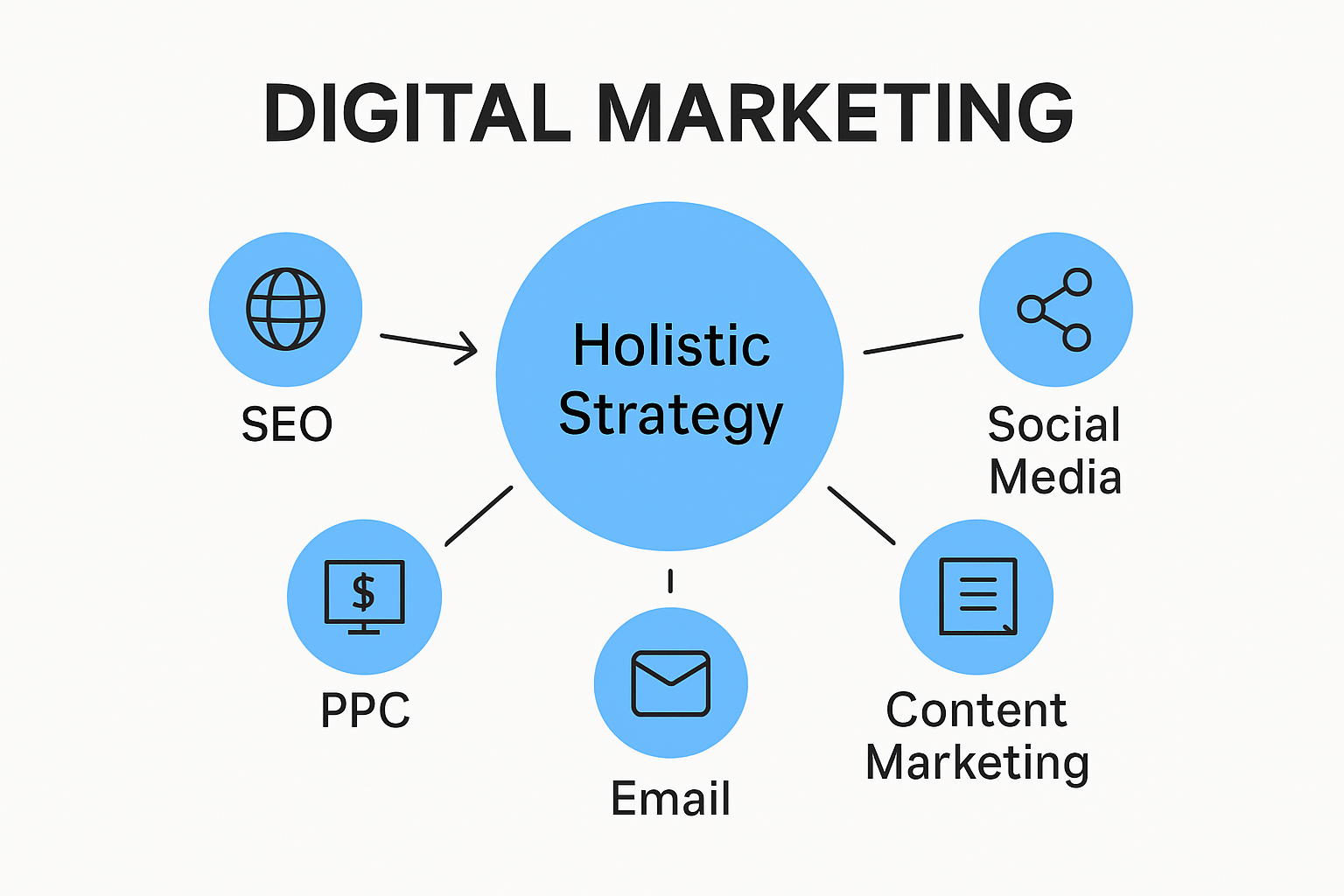Digital marketing keeps changing at breakneck speed, and companies are fighting hard to stay visible online. Here is something you might not expect. Email marketing brings a massive 4,200% return on investment, making it one of the most profitable digital channels out there. While flashy new tech grabs attention, tried-and-tested channels like email and SEO are quietly winning the race for business success in 2025.
Table of Contents
- Key Digital Marketing Channels Explained
- Choosing The Right Channels For Your Business
- Emerging Trends In Digital Marketing Channels 2025
- Maximising ROI Across All Digital Channels
Quick Summary
| Takeaway | Explanation |
|---|---|
| Search Engine Marketing is Essential for Visibility | To increase online presence, businesses should invest in both SEO and PPC strategies, focusing on keyword optimization and targeted ads for immediate results. |
| Understanding Your Audience is Crucial | Businesses need to conduct thorough research to define their target audience, considering behavioural patterns and communication preferences for channel selection. |
| Email Marketing Offers High ROI | Email marketing remains a key channel with a return of 4,200%, emphasising the importance of personalisation and segmentation to enhance engagement. |
| Embrace Emerging Trends like AI and Immersive Technologies | The future of digital marketing will rely on AI-driven hyper-personalization and immersive AR/VR experiences to engage customers effectively. |
| Implement Integrated Multi-Channel Strategies | To maximise ROI, businesses should adopt a holistic approach that ensures consistent messaging across channels and leverages cross-channel insights. |
Key Digital Marketing Channels Explained

Digital marketing channels have transformed how businesses connect with their audiences, offering unprecedented opportunities for targeted communication and engagement. Understanding these channels is crucial for organisations seeking to build robust online presence and drive meaningful customer interactions.
Search Engine Marketing: The Foundation of Digital Visibility
Search engine marketing represents a critical digital marketing channel that enables businesses to increase their online visibility and attract potential customers. According to research from Digital Marketing Institute, search engine optimization (SEO) and pay-per-click (PPC) advertising form the core of this powerful strategy.
SEO involves optimising website content to rank higher in organic search results, which requires strategic keyword implementation, quality content creation, and technical website improvements. Businesses investing in SEO can expect long-term benefits, with studies showing that top-ranking pages receive significantly more click-through rates compared to lower-ranked competitors.
PPC advertising allows organisations to purchase targeted advertising space in search engine results, providing immediate visibility for specific keywords. This approach enables precise audience targeting, with marketers controlling budget, demographics, and geographic reach.

Social Media Marketing: Building Authentic Connections
Social media platforms have emerged as dynamic digital marketing channels that offer unprecedented opportunities for brand engagement. These platforms allow businesses to create personalised content, interact directly with audiences, and build community around their brand.
Each social media platform offers unique advantages: LinkedIn provides professional networking opportunities, Instagram enables visual storytelling, Twitter facilitates real-time communication, and Facebook offers comprehensive demographic targeting. Effective social media marketing requires understanding platform-specific algorithms, creating engaging content, and maintaining consistent brand messaging.
Email marketing continues to be a powerful channel, with research indicating that 59% of consumers are influenced by marketing emails in their purchase decisions. This channel allows for highly personalised communication, segmented audience targeting, and measurable engagement metrics.
Content Marketing: Driving Value and Trust
Content marketing represents a strategic approach to creating and distributing valuable, relevant content to attract and retain a clearly defined audience. This channel goes beyond direct promotion, focusing on providing genuine value through blogs, videos, podcasts, and informative resources.
Successful content marketing requires deep understanding of target audience needs, consistent quality production, and strategic distribution across multiple platforms. By establishing thought leadership and addressing customer pain points, businesses can build trust and credibility in their respective industries.
The most effective digital marketing strategies integrate multiple channels, creating a cohesive approach that maximises reach and engagement. Organisations must continuously analyse performance metrics, adapt to emerging technologies, and remain responsive to changing consumer behaviours to maintain competitive advantage in the digital marketplace.
To help you better understand the unique strengths and uses of each main digital marketing channel covered above, here’s a comparison table highlighting their goals, key features, and best use cases:
| Channel | Main Goal | Key Features | Best Use Case |
|---|---|---|---|
| Search Engine Marketing (SEO & PPC) | Increase visibility, drive traffic | Organic ranking, paid ads, keyword targeting | Immediate and long-term web traffic |
| Social Media Marketing | Build engagement & community | Visual content, interaction, demographic targeting | Brand awareness, audience engagement |
| Content Marketing | Establish trust & provide value | Blogs, videos, podcasts, educational resources | Thought leadership, nurturing leads |
| Email Marketing | Personalised communication & conversions | Segmentation, automation, measurable ROI | Direct sales and relationship building |
Choosing the Right Channels for Your Business
Understanding Your Target Audience Dynamics
Effective channel selection begins with comprehensive audience research. Businesses must develop detailed customer personas that go beyond basic demographics, exploring behavioural patterns, online consumption habits, and communication preferences. Research from HubSpot indicates that companies with well-defined audience personas are 2-5 times more likely to exceed their marketing goals.
Different audience segments prefer distinct communication channels. Younger demographics might gravitate towards visual platforms like Instagram and TikTok, while professional audiences might engage more extensively on LinkedIn. Understanding these nuanced preferences allows businesses to tailor their digital marketing strategies with precision.
Aligning Channels with Business Goals
Each digital marketing channel serves unique strategic purposes. A comprehensive study by MIT Sloan Management Review revealed that businesses achieving the highest marketing performance meticulously match channels with specific organisational objectives.
For instance, businesses focused on brand awareness might prioritise social media and content marketing, while those seeking immediate sales conversions could emphasise search engine marketing and targeted email campaigns. Multichannel strategies provide additional advantages: research suggests that a diversified social media approach can increase web sales by 2 to 5 percent through reinforced brand impressions.
Resource Allocation and Performance Metrics
Choosing digital marketing channels involves careful consideration of resource constraints. Small businesses with limited budgets must prioritise channels offering the most cost-effective engagement. This requires continuous performance tracking and willingness to adapt strategies based on empirical data.
Key performance indicators (KPIs) such as conversion rates, engagement metrics, and customer acquisition costs provide crucial insights. Businesses should implement robust analytics tools that enable real-time monitoring and provide actionable intelligence for strategic refinement.
Successful digital marketing is not about being present on every possible platform, but about strategic, targeted presence. By understanding audience dynamics, aligning channels with business goals, and maintaining flexible, data-driven approaches, organisations can develop compelling digital marketing strategies that drive meaningful business outcomes.
The following table summarises how channel selection should align with target audience and business goals for best results:
| Business Objective | Recommended Channels | Target Audience Example |
|---|---|---|
| Brand Awareness | Social Media, Content Marketing | Younger, broad demographic |
| Immediate Sales/Conversions | Search Engine Marketing, Email | Ready-to-buy segments |
| Thought Leadership | Content Marketing, LinkedIn | Professional & B2B audiences |
| Customer Retention | Email Marketing, Social Media | Existing customers, loyal audience |
Emerging Trends in Digital Marketing Channels 2025
The digital marketing landscape continues to evolve rapidly, with technological innovations reshaping how businesses communicate and engage with their audiences. As we approach 2025, several transformative trends are set to redefine digital marketing strategies and customer interactions.
Artificial Intelligence and Hyper-Personalization
Research from El País highlights the revolutionary impact of Artificial Intelligence in digital marketing. AI technologies are enabling unprecedented levels of content personalization, allowing businesses to create highly targeted marketing experiences that resonate with individual consumer preferences.
Machine learning algorithms now analyse vast amounts of user data in real-time, creating dynamic content that adapts to individual user behaviour, preferences, and historical interactions. This goes beyond traditional segmentation, offering truly individualized marketing experiences that feel intuitive and relevant to each user.
Immersive Technologies Transforming Customer Engagement
According to Forbes, Augmented Reality (AR) and Virtual Reality (VR) are revolutionizing digital marketing by providing immersive experiences that dramatically enhance customer interaction and decision-making processes.
Retail and e-commerce sectors are leading this transformation, implementing virtual try-on technologies, interactive product demonstrations, and 360-degree experience platforms. These technologies allow customers to engage with products in unprecedented ways, reducing purchase uncertainty and creating more engaging marketing interactions.
Voice and Conversational Marketing
The rise of voice-activated devices and advanced natural language processing is creating new digital marketing channels. Smart speakers, voice assistants, and conversational AI are becoming critical touchpoints for customer engagement, requiring businesses to develop sophisticated voice search optimization and conversational marketing strategies.
Businesses are developing more nuanced approaches to voice interactions, creating conversational experiences that feel natural and provide genuine value. This involves understanding context, intent, and delivering precise, helpful responses that align with user expectations.
These emerging trends demonstrate that digital marketing in 2025 will be characterised by greater personalisation, technological immersion, and intelligent, context-aware interactions. Successful organisations will be those that can seamlessly integrate these technologies while maintaining authentic, meaningful connections with their audiences.
The future of digital marketing is not just about technological capability, but about creating more human-centric, intuitive experiences that genuinely understand and respond to individual customer needs and preferences.
Maximising ROI Across All Digital Channels
Maximising return on investment (ROI) across digital marketing channels demands a strategic, data-driven approach that balances resource allocation, performance tracking, and continuous optimization. Businesses must develop sophisticated methodologies to extract maximum value from their digital marketing investments.
Strategic Channel Investment and Performance Metrics
Research from First Page Sage reveals that Search Engine Optimization (SEO) delivers an impressive average ROI of 748%, highlighting the critical importance of understanding channel-specific performance metrics. This underscores the necessity of implementing robust tracking mechanisms that provide granular insights into each digital marketing channel’s effectiveness.
Successful ROI maximization requires businesses to move beyond surface-level metrics, diving deep into nuanced performance indicators. This involves tracking not just direct conversions, but also engagement quality, customer lifetime value, and the interplay between different marketing channels.
Email Marketing: The High-Yield Digital Channel
According to comprehensive marketing research, email marketing continues to demonstrate extraordinary financial efficiency, delivering an astounding average return of 4,200% - translating to $42 generated for every $1 invested. This remarkable performance makes email marketing a cornerstone strategy for businesses seeking cost-effective digital communication.
To maximize email marketing ROI, organisations must focus on sophisticated segmentation, personalisation, and automated nurturing strategies. This involves creating highly targeted content, implementing intelligent automation workflows, and continuously refining audience targeting based on behavioural data.
Integrated Multi-Channel Optimization Strategies
Effective ROI maximization transcends individual channel performance, requiring a holistic, integrated approach. Businesses must develop comprehensive strategies that create synergies between different digital marketing channels, ensuring consistent messaging and leveraging cross-channel insights.
This integrated approach involves:
- Unified Data Analytics: Implementing advanced analytics platforms that provide comprehensive visibility across all digital marketing channels.
- Cross-Channel Content Strategy: Developing consistent brand narratives that resonate across different platforms and touchpoints.
- Continuous Learning and Adaptation: Establishing agile marketing processes that enable rapid strategy refinement based on real-time performance data.
The most successful digital marketing strategies recognize that ROI is not just about immediate financial returns, but about building long-term customer relationships and brand equity. By adopting a sophisticated, data-driven approach that balances financial efficiency with strategic vision, businesses can transform their digital marketing investments into sustainable competitive advantages.
Ultimately, maximising ROI requires a combination of technological sophistication, creative strategy, and relentless commitment to understanding and serving customer needs across evolving digital landscapes.
Frequently Asked Questions
What are the key digital marketing channels for businesses in 2025?
The key digital marketing channels in 2025 include Search Engine Marketing (both SEO and PPC), Social Media Marketing, Content Marketing, and Email Marketing. These channels help businesses increase visibility, engage with audiences, and drive conversions effectively.
How does email marketing achieve a high return on investment?
Email marketing can achieve a return on investment of up to 4,200% by enabling businesses to communicate directly with consumers through personalized, segmented messages. This approach enhances engagement and encourages conversions significantly.
Why is understanding the target audience crucial in digital marketing?
Understanding your target audience is crucial because it allows businesses to tailor their marketing strategies based on behavioural patterns, preferences, and communication styles, ensuring effective engagement and increased success in meeting marketing goals.
What emerging trends should businesses consider in their digital marketing strategies for 2025?
Emerging trends to consider for 2025 include Artificial Intelligence for hyper-personalization, immersive technologies like Augmented Reality (AR) and Virtual Reality (VR) for enhanced customer engagement, and Voice and conversational marketing, which are reshaping how businesses interact with their audiences.
Ready to Turn Digital Marketing Strategy into Real Business Growth?
You have just seen how top digital marketing channels—like SEO, content marketing, and email—can transform visibility and boost ROI. But putting these channels to work can feel overwhelming, especially when your digital footprint holds the key to your success in 2025. If you are struggling to align your marketing channels with your business goals or to find the right balance between engagement, personalisation, and technical performance, you are not alone. Many companies face the same challenge: they know what needs to be done but do not know how to build a seamless online presence that actually gets results.
This is where Cloudfusion steps in. Our team specialises in crafting bespoke websites and digital solutions that set the perfect foundation for your multichannel marketing approach. Whether you need a powerful new website, a more integrated content strategy, or a full digital transformation, we offer custom, scalable solutions tailored for your industry. Why wait? If you want to turn digital marketing insights into measurable business growth, request a web development quotation today. Let us help you build, launch, and grow an online presence that brings your marketing strategy to life.








